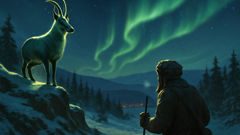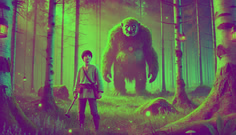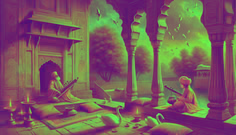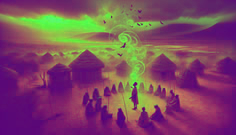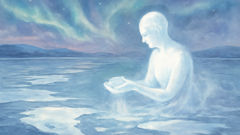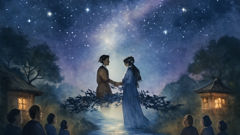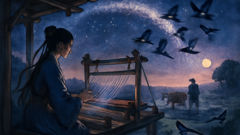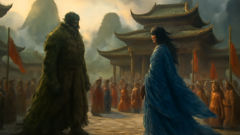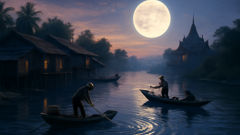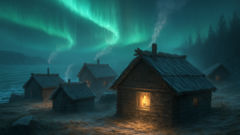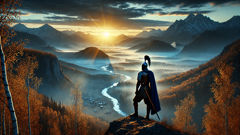Introduction
On the northern edge of maps and speech, where birch and larch thin to stony wind and the rivers learn to move with a slow, thoughtful patience, the mountains keep their own counsel. People of the valley spoke of them in low voices: not as empty slopes to be conquered, but as living bones of the land, folded and scarred and home to things older than the villages that ringed their feet. Among those old things, the elders said, there was a creature neither wholly beast nor wholly spirit — a goral, small and lithe like an antelope, with a coat that shimmered with the color of dusk and horns that seemed carved from the starlight itself. Hunters and shepherds from timbered huts and smoke-dark kitchens learned to leave a knot of bread at a cairn, whisper a name before the ridge, and turn their face away when they had taken life in the name of hunger. For the goral did not punish by direct cruelty; it kept balance. It guided the lost, nudged travelers back to safe hollows during blizzards, and would appear, at times, as a faint phosphorescent silhouette on a ridge, watching with patient eyes. The legend traveled slowly — around firelight, through the hum of sled runners, carried in the mouths of those who had been found or those who had lost someone and heard, afterward, a soft belling on the wind. Some said the goral was a guardian of the mountainherd, others that it was a memory given form by the land's grief and mercy. Still, each telling carried a shape of the same thing: respect leads to protection; arrogance invites forgetting. This is the tale of a boy who followed a hare too far, a hunter who honored what he could not take, and a last winter when the goral's light saved a caravan and, in doing so, asked the living to remember an old promise.
The First Hunt and the Quiet Pact
When the snow had the first teeth of winter and the streams began to wear their skins of ice, the men of the lower settlements readied their winter gear. Sledges were tightened, harness leather rubbed with fat, knives whetted until their edges sang. Among them was Demyan, son of a man whose hands knew the language of nets and snares, whose shoulders had learned how to bear a family through thin seasons. Demyan's eyes were quick, and his laugh could loosen the sternest face, but his hands were not always patient. The first time the story says the goral revealed itself, it was to teach patience.
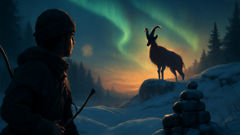
Demyan rose before dawn and, with two companions, climbed the lower ridges to a stand of rock where goats sometimes came to lick mineral salts?—?thin veins of the mountain that tasted of iron and sky. They moved light-footed, breath pluming white, hunting not for sport but for skins that would feed the winter pot. They passed the cairn of stones where the old offerings were left: a scrap of bread, a notch in wood, a whispered name to the ridge, all small debts to the thing that kept the mountains temperate toward men. Demyan tugged his cap and, as the others passed a frozen pool, he slipped from the line after a hare that ghosted under a tangle of larch and rock. The hare, silver with cold, led him past the known scrapes and over a shoulder of rock until he found himself in a bowl of wind where the sky felt closer and the world tasted of metal.
He missed the way back. The tracks that looked familiar dissolved into a pattern of drifts and wind-sculpted shadows. The sun slid early toward sullen hills. The day tightened. Demyan cursed softly, and in the space where he pressed his palms to the bark of a tree, he heard behind him breath that was not wholly the wind. He turned and saw, across the saddle-shaped notch, the goral. It stood not large or threatening but held an immediacy that made his limbs remember old reverence. The creature's coat seemed stitched with the color of the mountain's moss and the light of spent dusk; its horns rose in twin crescents that caught the thin sun like an offering.
Demyan, who had taken many things from the land without counting the cost, felt something like apology hitch in his chest. He understood, as men sometimes understand when the earth speaks, that it was not merely a creature he had followed but a keeper. He bowed habitually — a child's mimic of the elders — and his breath escaped in a fogged sigh. The goral did not flee. Instead it took two lithe steps, turned its head once as if listening to a distant bell, and then moved along the ridge with an unconcerned grace, pausing to look back. The young man followed. He could not say why. It was as if the mountain had put a hand on his shoulder and guided him.
They walked until the notch bent their steps eastward and the trees thinned to where Demyan could see the little plumes of smoke from the village. He returned with the hare and with a story in his mouth that tasted like awe. He bowed before the cairn and left the notch of bread he had taken the day before. The elders nodded, but the most important lesson they offered was not in words: it was in the silence that followed, a silence like a covering. "Always give back," said the oldest woman in the smokehouse, tapping the rim of her cup. "Not because you fear the mountain, but because you belong to it when it chooses to hold you."
Years folded on. Demyan's patience made him a careful man. He learned the angles of the wind and how the gulls signaled hidden thaw where foxes had left routes. He taught his children to leave a scrap at the cairn and to sing the mountain's name when they passed. Every winter one or two travelers would speak, sometimes years later, of a pale pair of eyes at a ridge, or of horns glimmering against the aurora; they became more than rumor. The goral, it was said, did not appear to every man who asked. It rose for those who had kept the pact: men and women who gave their silent thanks, who mended fences, who shared meat at the communal hearth. That winter Demyan learned the shape of reciprocity; he learned that the spirit did not simply rescue but expected memory.
There was an older tale whispered then about a hunter who had stolen horns for trophies and found himself, years later, deaf to the mountain's counsel. His sledge had broken on a spit of rock; the north wind watched and did not soften. The goral had not moved for him. Instead, from the ridge, the creature had watched as a small fox carved a path that would have returned the hunter to his village if he'd read the signs. The hunter, arrogance thick in his veins, had followed a greedier path and did not return. This moral was not a moral in the sense of a sermon: it was a warning formed in the bone of story, easy to remember because the mountain made memory of it. People spoke it around fires to remind themselves how fragile a life is when set against the patience of peaks.
At the year's end, when the moon hung low and the auroras tuned the nights like a strange harp, a caravan set out from the village. They carried furs and salted fish and the fragile hope of trade beyond the line of trees. Demyan, who had become known for his steadiness, traveled with them. The storm rose with a quick and terrible sense, as though the sky, offended, had pulled a blanket over the world. Sled runners scraped the ice. Men sang to keep their hands warm. The wind took a tent flap and threw it like a flag into a ravine. Twice the caravan needed a guide to a safe hollow, and twice a faint belling sound, as if made by a distant shell, answered in the dark. At the ridge where everything could have fallen away, the goral appeared, not in the full light of flesh but a pale suggestion, and turned its head as if to mark the path. Those who had remembered to leave small offerings and to speak the mountain's name found the hollow the goral folded into the snow; those who had been careless felt the narrowness of their choices. That night, the goral moved along the ridge and watched the caravan with a tolerance that felt like mercy, and it solidified its place in the valley's conscience: a guardian that required more than prayer, one that required habit and an honest hand.
A Caravan, a Blizzard, and the Memory the Goral Required
The second part of the legend is stitched from the voices of those who kept ledgers of trade and those who kept nothing but memory. Years after Demyan's quiet debt, the village grew a little, a cottage leaning toward another like two people warming to one fire. The world beyond the valley opened slowly: traders came with strange metal that hummed and with bolts of cloth brighter than any birch leaf. With trade came a thicker sense of self, and with self came the danger that a people might forget their small rituals. The carving of the cairn continued, but some men began to think the goral a superstition, something children passed between teeth like sweetmeats. To remind themselves of the story's gravity, the elders told of the winter known afterward as the Year of Teeth — when the storm came without warning, like a closed fist.
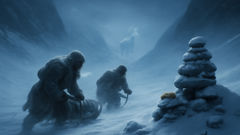
A merchant, Reznik by name, left the village with three loaded sleds and the cheap certainty of a man who believed his ledgers immune to the weather. He wore a coat trimmed in fox fur and boots stitched with the tassels of many hunts. His goods were meant for a town beyond the timberline, a town that would pay in grain and salt. He had no patience for cairns. "A notch of bread is not a down payment on weather," he said once in the smokehouse where elders watched. He bargained at the booth when the price was meant to be a story, and his laughter had a sharpness that did not sit well with the women who read the weather in the sky's wrinkles.
Reznik's caravan set when a bruise of cloud pulled itself into the east. The day cooled, then cooled again with the determination of something that had chosen its course. The first white began like ash on the wind. By the second day it was a true blindness. Runners sank. Drivers shouted. The sleds, weighted with trade, slid and lurched. The world shrunk to the mouth of the caravan. Men complained and cursed, and Reznik swore that he had never been so insulted by cold. On the third night, when hunger made their mouths paper and when the stars were gone, Reznik ordered the men to force march, certain that beyond the ridge some warmth waited. They stumbled into a ridge-laced bowl and found themselves turned around by a wall of pale. Panic is like a crack in ice: once it starts, it runs quick.
It was then, at the point where they might have given up or have been forever changed into a lesson, that one of the pack drivers, an old woman named Katya who grew up with Demyan's children, lifted the simple sack she always carried. She prized that sack because in it lay a small cloth and a crust of bread wrapped in lard, the kind of slow preservation that kept because of its economy and care. She set the bread, not toward the wind but upon a small pile of stones she had arranged into a cairn. Some of the caravan jeered. Reznik spat and said such things were for fools. But the storm was a living thing, fickle and ancient; its mercy was not purchased in coin. Katya closed her palms and breathed a name she had kept from her grandmother: a name not for the goral so much as for the mountain to recognize its kin. The wind took it like a quiet, scattering it into the folds of the white.
The goral answered in a way that is difficult to explain logically but easy to commit to memory. At first there was only a thin chiming — a sound like a bell played in water — and a temporary widening in the squall. It was as if someone had pushed a curtain aside to reveal the line of a path. The caravan saw a pale silhouette on a distant ridge: small, sure, and staggering the eye with its odd brilliance. It stood half-silhouetted against the pallor of the storm and seemed to mark a safe route between two broken ledges where the snow had not hollowed into a grave. Reznik argued. Men argued. But they followed, more because they had no other choice than because a stubborn skepticism could not hold against the cold that gnawed like an animal.
They moved slowly, hushed by the guide's unspoken confidence. When a sledge tipped and the runner snapped, it was the goral's intervention that mattered less in mechanics than in effect: the men who had a memory of the pact and those who had given small gifts found the steps first; they knew which stones to grip and which rocks to skirt. Those who had been thoughtless floundered. The caravan reached a hollow where a sliver of wood, abandoned by a passing hunter, served as an improvised shelter, and there they huddled through a night that cracked like ice. In the morning, when the sky opened like a tired eye, the goral had gone. What remained were prints like a series of small moons along the ridge and a fresh scattering of salt that no one had brought. Some swore they saw the goat's breath curl up like a prayer; some noticed the horns' shadows lay across the snow like a blessing.
Reznik returned to the market, changed in ways he did not first name. His hands had learned a gentler work with ropes. He began the slow business of mending relationships, thread by thread. He left small gifts — tobacco, sugar, a strip of cloth — at the cairn and taught his sons to do the same. The year the storm passed had another consequence: the tale of the goral spread beyond the valley. Caravans that had once scoffed began to adopt the ritual of leaving a scrap. In the years after, the goral's legend anchored itself not by fear but by gratitude. At weddings, cooks would give a pinch of the first bread to the cairn; at funerals the shepherds left a tuft of wool. The mountain had not demanded riches. It had asked for attention and memory.
But the goral's presence was not only consolation. The old ones insisted the creature's guidance was not unconditional rescue but rather a test of reciprocity. There are stories within the community that record moments when men did everything right and still had to pay the cost of nature's stern balance: a hunter who returned the goral's favor but misread the weight of his sled; a woman who sang for the mountain and was, nonetheless, called inward by illness. The goral was a guardian that reminded people life was measured in small trades and patient regard. To the villagers, it was better to think deeply about the mountain's allowances than to believe in a capricious savior. The goral, in their stories, acted like a ledger keeper: he recorded kindness and heedlessness with the same impartial eye.
Generations passed and the ritual grew more woven into daily life. Children who once treated the cairn as a child's superstition came to understand the texture of the land and the reason behind small offerings: they learned to listen to wind changes, to watch how rabbits moved with the weather, to know when a bear's spoor meant danger or passage. The goral became less of a visible guardian and more of a moral geography, an invisible ledger that reminded villagers to be small in the face of hills, patient with hunger, and generous to neighbors. When travelers came from far places and asked how a people could live so near such peril, the villagers answered simply: "We remember. We give back. The mountain, when remembered, will hold us."
Conclusion
Stories do strange, useful things: they teach a way of seeing until that way becomes ordinary. The villagers of the ridge learned that the goral's light was not a commodity to be owned but a relationship to be tended. In time, the animal walked the line between myth and lesson, a creature whose presence translated into habits — the leaving of bread, the tying of a ribbon to a cairn, the naming of the mountain when one passed. Hunters who once took without thought found their hands altered by the practice of returning a small portion. Parents who had only been told the anecdote of Demyan taught their children to watch tracks and rustle, to read the slope's mood like an old friend. The legend also expanded outward, shaping the way caravans moved through winter, how merchants learned to respect a land that could be generous but never obliging.
The goral never became a god that demanded worship, nor a monster of fable that punished on instinct. It was, instead, a curator of the mountain's economy of care: a being that nudged those who listened, with a luminous hoof and a patient gaze. When a traveller finds himself lost on a ridge in the long white nights, he might recall this story and leave, by habit, a scrap of bread on a low cairn. Such small things, when multiplied over age and season, keep a fragile weave intact. In the telling of the legend, the mountains keep it alive: not as a single miracle, but as a long practice of respect that is both pragmatic and sacred. That is why, even now, on wind-scratch nights when auroras comb the sky, the people of the valley still pause at a stony knob and put down the smallest of offerings. They do it because they remember the caravan pulled through, the merchant who rewired his pride, the boy who learned humility, and because the land is better kept when its keepers remember to keep it back. The goral remains in the stories as a guardian of a practical compassion — a reminder that the wild returns what it is given and that the truest protection comes from a community that pays its debts in attention and care.

